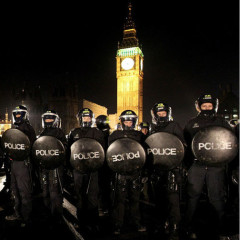 The latest revelation that the police have been trying to recruit informants about the political activities of university students produces an unpleasant and disturbing reaction that Britain is drifting into an authoritarian state where suppression of human rights and civil liberties is becoming commonplace. The Guardian reports that the police officer from a covert unit says it is necessary to to find informants to target ‘student-union type stuff’ because the police cannot infiltrate their own officers into universities. In other words, they would if they could. Continue reading
The latest revelation that the police have been trying to recruit informants about the political activities of university students produces an unpleasant and disturbing reaction that Britain is drifting into an authoritarian state where suppression of human rights and civil liberties is becoming commonplace. The Guardian reports that the police officer from a covert unit says it is necessary to to find informants to target ‘student-union type stuff’ because the police cannot infiltrate their own officers into universities. In other words, they would if they could. Continue reading
Tagged with Police Surveillance
Hiding government’s sins and misdemeanours
 The nature of the British state and the government’s contempt for personal freedom come to a head with new laws proposed for the Queen’s Speech next month. It was already known that the government intended to bring forward a law to allow the police and MI5/6, without a warrant, to access data from every phone call, email, text message and internet browsing. Now the government is proposing to add secret courts to total surveillance. Continue reading
The nature of the British state and the government’s contempt for personal freedom come to a head with new laws proposed for the Queen’s Speech next month. It was already known that the government intended to bring forward a law to allow the police and MI5/6, without a warrant, to access data from every phone call, email, text message and internet browsing. Now the government is proposing to add secret courts to total surveillance. Continue reading
Our internet use is none of the state’s business
 Britain already has more CCTV cameras than anywhere else in the world, and a four million strong DNA database that contains details of thousands of UK residents who have committed no crime.
Britain already has more CCTV cameras than anywhere else in the world, and a four million strong DNA database that contains details of thousands of UK residents who have committed no crime.
Should the state be granted its apparent desire to have access to every single phone call made, every last text message and email sent, and each website visited by anyone in Britain, it would be possessed of an arsenal of surveillance techniques that would have been the envy of the classic totalitarian regimes of the past. Continue reading
Who will police the police?
 It’s not just the well-reported antics of Mark Kennedy that call in question the activities of undercover policing against political and protest groups. It’s the almost total lack of accountability about the clandestine operations of police spies over the last 40 years. The HMIC report on this episode draws attention to Kennedy’s failure to “follow codes of practice for undercover officers” or to report his sexual activities with those he was targeting, but fails to call attention to the much more serious charge that his handlers or the CPS, or both, deliberately ignored evidence that Kennedy had provided, in order to secure the false conviction of 100 protestors at a power station in Nottinghamshire. Continue reading
It’s not just the well-reported antics of Mark Kennedy that call in question the activities of undercover policing against political and protest groups. It’s the almost total lack of accountability about the clandestine operations of police spies over the last 40 years. The HMIC report on this episode draws attention to Kennedy’s failure to “follow codes of practice for undercover officers” or to report his sexual activities with those he was targeting, but fails to call attention to the much more serious charge that his handlers or the CPS, or both, deliberately ignored evidence that Kennedy had provided, in order to secure the false conviction of 100 protestors at a power station in Nottinghamshire. Continue reading
